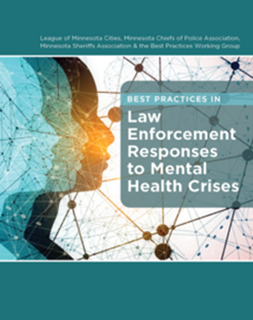 |
| A NAMI resource guide for those experiencing a mental health crisis. |
At present, many law enforcement agencies are experiencing high demand for crisis services but have no clear answers for what to do about it. The statistics are concerning: One-fifth of adults and nearly one-half of adolescents in the United States live with a mental illness.
Additionally, estimates hold that between 6% and 10% of all police calls involve someone with a serious mental illness. These calls all too often end in tragedy — approximately 23% of those killed by officers in 2015 had a mental illness.
Best Practices in Law Enforcement Responses to Mental Health Crisis
 |
| A Responses to Mental Health Crises guide for law enforcement agencies. |
The guide chronicles current response challenges faced by agencies and identifies realistic solutions and approaches for addressing those challenges based on a set of mutually agreed-upon guiding principles. The best-practices guide explains why a mental health crisis became a police matter, the response goals, guiding principles, and what cities can do to assess their own needs and develop a local approach using Minnesota examples and initiatives.
The differences in resources from one place to another in Minnesota can be vast. Law enforcement managers using this guide are encouraged to consider whether there are gaps or needs for improvement in the services currently being provided in their community, and to explore whether it is possible to address them through additional resources, collaboration, or training.
Download the guide, “Best Practices in Law Enforcement Responses to Mental Health Crises” (PDF).
Mental Health Crisis Data
In 2022, Minnesota lawmakers amended sections of the Data Practices Act and the Health Records Act to provide law enforcement with clearer access to mental health information about persons in active crisis. When responding to a mental health crisis, Minnesota law now allows law enforcement agencies to obtain limited but private mental health information about the person in crisis to aid in managing the situation safely. Agencies that seek or use this sensitive information are required to have a written policy establishing privacy safeguards.
View the informational memo and download the model policy, “Mental Health Crisis Data” (PDFs).
Use LMC’s model policy to get started
LMCIT has also created a model policy so agencies can point toward a tool that will help keep their officers and the community safe. The model policy establishes guidelines for officers responding to mental health crisis situations and supplements the information provided in the best practices guide.
A link to the LMC model “Responding to Mental Health Crisis Calls” Policy can be found below and addresses several key areas:
- The purpose of the policy.
- The priorities and objectives established within the policy, including providing for the safety of all concerned.
- The use of mobile crisis response teams and/or an embedded mental health professional or social worker including referrals to services and treatment.
- The appropriate response, discretion, and disengagement in a crisis call.
- Use of transport holds under Minn. Stat., § 253B.051.
- Required incident or admission reports.
- The crisis intervention and mental illness training requirements of Minn. Stat., § 626.8469.
Download the model policy, “Responding to Mental Health Crisis Calls” (PDF).
Benchmark Analytics Research Study
LMCIT recently completed the first year of a research study with Benchmark Analytics to utilize predictive analysis to identify key risks facing Trust member law enforcement agencies and to provide evidence-based recommendations for approaches most likely to address these risks.One of the identified evidenced-based practices focused on how an agency managed their response to mental health related calls. The research showed a moderate correlation to a reduction in liability claims for agencies that had a specific policy on identifying and engaging individuals in mental health crisis, and/or had extensive training for responding to mental health crises calls in their community.
If you have any questions or would like to have a summary copy of the Benchmark Analytics research study referenced above, please contact me at tstille@lmc.org or (651) 215-4051.
Remember: Responder Safety = Public Safety
In the meantime, stay safe and be careful.
Tracy

